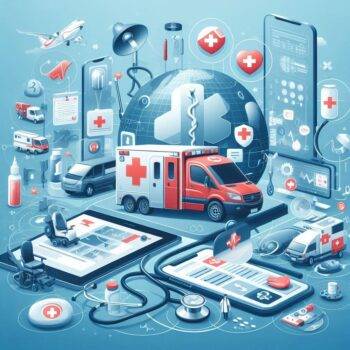
Navigating healthcare and emergency services in a foreign country can be daunting, especially for expats in China.
Understanding the healthcare system, knowing where to seek medical care, and being prepared for emergencies are essential for maintaining your health and safety.
This guide provides detailed information and practical tips to help expats access healthcare and emergency services in China with confidence.
Overview of the Healthcare System in China
China’s healthcare system is a mix of public and private facilities, each with its own advantages and challenges.
Expats should familiarize themselves with both options to make informed decisions about their healthcare needs.
1. Public Hospitals
- Availability: Public hospitals are widespread and offer a full range of medical services. They are often the first choice for locals due to affordability.
- Language Barrier: Most public hospitals do not have English-speaking staff, which can be challenging for expats. Translation apps like Google Translate or Pleco can help, but hiring a translator or bringing a Chinese-speaking friend is recommended.
- Quality of Care: The quality of care varies significantly:
- In major cities like Beijing, Shanghai, and Guangzhou, public hospitals are well-equipped and staffed with highly trained professionals.
- In rural areas, facilities may lack advanced equipment and specialized care.
2. Private Hospitals and Clinics
- International Standards: Private hospitals and clinics often cater to expats and meet international standards. Many have English-speaking staff and offer personalized care.
- Convenience: Shorter waiting times, better facilities, and a more comfortable environment make private hospitals a preferred choice for expats.
- Cost: Private healthcare is significantly more expensive than public hospitals. Expats are advised to have comprehensive health insurance to cover these costs.
- Examples of Expat-Friendly Hospitals:
Health Insurance for Expats
Having health insurance is essential for expats in China, as it can cover the high costs of private healthcare and provide peace of mind in emergencies.
1. International Health Insurance
- Coverage: Offers comprehensive coverage, including access to private hospitals and international healthcare services.
- Portability: Ideal for expats who travel frequently, as it allows access to medical care in multiple countries.
- Recommended Providers:
2. Local Health Insurance
- Affordability: More affordable than international insurance but typically limited to public hospitals and some private clinics.
- Suitability: Best for expats planning to stay in China long-term and who do not require international coverage.
- How to Apply: Local insurance can often be arranged through your employer or purchased directly from Chinese providers like Ping An or China Life.
Common Medical Services and Procedures
Expats in China may need access to a variety of medical services. Here’s what to expect:
1. General Practitioners (GPs)
- Primary Care: GPs handle routine check-ups, vaccinations, and treatment for common illnesses.
- Where to Find Them: Available at both public and private hospitals. Private clinics like Jiahui Health in Shanghai are popular among expats.
2. Specialists
- Referrals: In public hospitals, you may need a referral from a GP to see a specialist. Private hospitals often allow direct appointments.
- Availability: Specialists are more accessible in major cities than in rural areas.
3. Emergency Services
- Ambulance Services: Dial 120 for medical emergencies. However, response times can vary, especially in rural areas. In urgent cases, many expats use ride-hailing apps like Didi to get to the hospital faster.
- Emergency Departments: Most hospitals have emergency departments, but the quality of care can vary. Private hospitals generally provide faster and more reliable emergency care.
4. Pharmacies
- Availability: Pharmacies are widespread, with many open 24/7 in major cities.
- Medications: Both over-the-counter and prescription medications are available. However, some international medications may not be stocked. Bring a supply of essential medications from your home country if possible.
Preparing for Emergencies
Being prepared for emergencies is crucial for expats living in China.
Here’s how to stay ready:
1. Emergency Numbers
- Medical Emergencies: Dial 120 for an ambulance.
- Police: Dial 110 for police assistance.
- Fire: Dial 119 for fire emergencies.
2. Emergency Contacts
- Embassy or Consulate: Keep the contact information of your country’s embassy or consulate readily available. For example:
- Local Contacts: Have the phone numbers of local friends, colleagues, or neighbors who can assist in an emergency.
3. Emergency Kit
- Prepare an emergency kit with:
- Essential medications
- First aid supplies
- Copies of important documents (passport, insurance details)
- Emergency contact information
Tips for Staying Healthy in China
1. Regular Check-ups
Schedule regular medical and dental check-ups to maintain good health. Private clinics like Parkway Health offer English-speaking services.
2. Vaccinations
Ensure you are up-to-date on routine vaccinations. Additional vaccinations, such as for hepatitis A and B, typhoid, and Japanese encephalitis, may be recommended for China. Check the CDC’s travel health page for China for guidance.
3. Air Pollution
Air pollution is a significant health concern in many Chinese cities. Protect yourself by:
- Using air purifiers at home.
- Wearing high-quality masks (e.g., N95) on days with poor air quality. Check real-time air quality levels using apps like AirVisual.
4. Food and Water Safety
- Avoid drinking tap water; use bottled or filtered water instead.
- Be cautious with street food and ensure food is cooked thoroughly to avoid foodborne illnesses.
5. Mental Health
Mental health services are available at private hospitals and clinics. Online platforms like BetterHelp or Talkspace can also provide remote counseling in English.
Conclusion
Navigating healthcare and emergency services in China can be challenging, but being informed and prepared can make a significant difference.
By understanding the healthcare system, obtaining appropriate health insurance, and preparing for emergencies, expats can ensure their health and safety while living in China.
For further information, explore these resources:
With the right preparation, you can confidently access the healthcare services you need and enjoy a safe and healthy experience in China.


